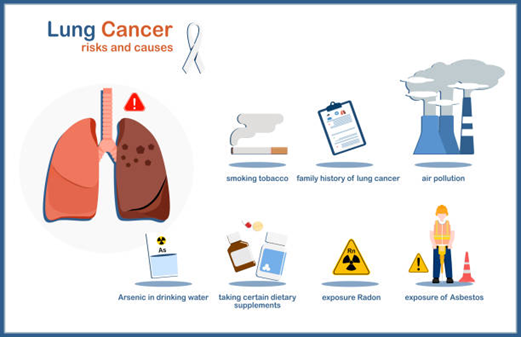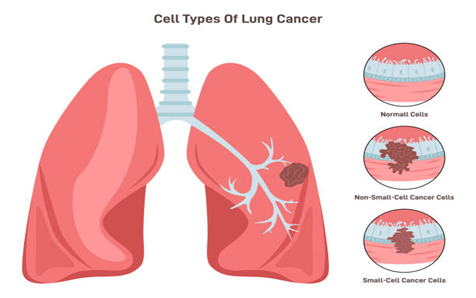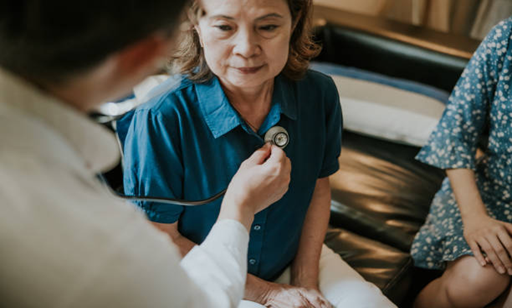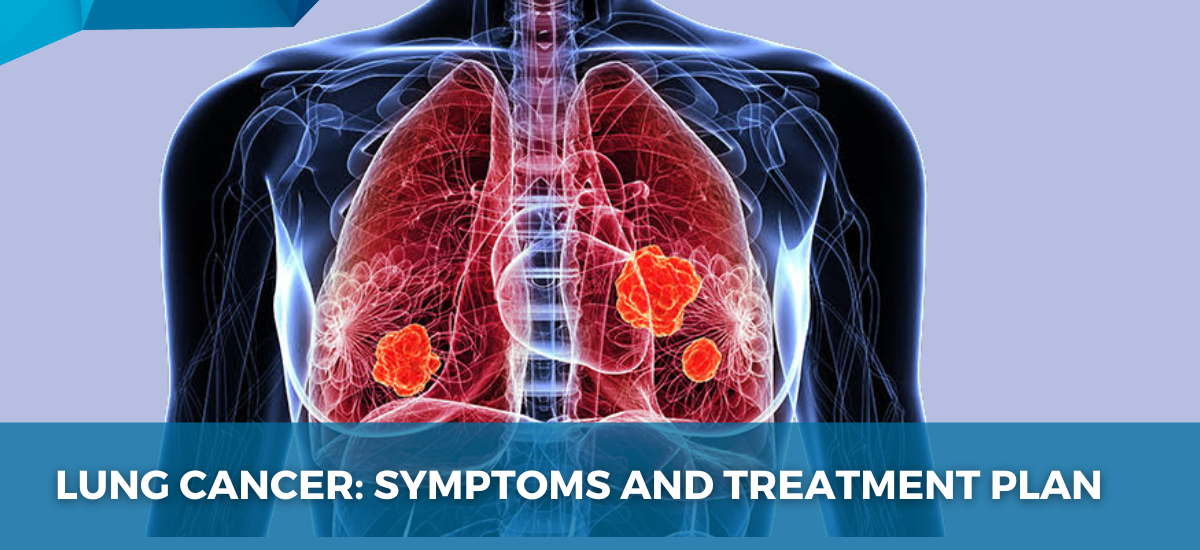- Have any questions?
- 085913 90567
- drgeorgechestdiseases@gmail.com
Lung Cancer: Symptoms and Treatment Plan

Smoking and Lung Cancer: Understanding the Deadly Connection
December 23, 2024Lung cancer is one of the most common types of cancer. Its symptoms can often be subtle or mistaken for other conditions. Therefore, it is crucial to recognize these symptoms and understand the available treatment options. Dr. George Karimundackal states, “Timely intervention and a well-structured treatment plan can significantly improve outcomes.” He emphasizes that early detection and personalized treatment are crucial for effective management of lung cancer.
Dr. George Karimundackal is a highly acclaimed surgical oncologist in Mumbai, renowned for his expertise in thoracic surgery. With over two decades of experience, he has helped countless patients navigate their cancer journey with compassion and precision. His approach combines cutting-edge technology with a patient-centric treatment plan, ensuring the best possible outcomes.
Take control of your lung health today. Consult a specialist for expert advice on your symptoms and treatment options. Book your appointment now!
What is Lung Cancer?
Lung cancer is a disease characterized by the uncontrollable growth of abnormal cells in the lungs, leading to the formation of tumors that can disrupt normal lung function. It represents about 11.4% of all cancer diagnoses globally. In India, lung cancer accounts for approximately 5.9% of all cancers, with a higher prevalence among men than women.
Now, let’s know the significant risk factors and causes of lung cancer.
What Causes Lung Cancer?

- Smoking: The leading cause of lung cancer, responsible for approximately 85% of cases. Smoking damages the cells in the lungs, leading to mutations that can result in cancer.
- Secondhand Smoke: Even non-smokers can develop lung cancer if they are regularly exposed to secondhand smoke.
- Exposure to Radon Gas: Radon is a naturally occurring radioactive gas that can accumulate in homes and workplaces. Long-term exposure can lead to lung cancer.
- Asbestos Exposure: Asbestos, once widely used in construction, is known to cause lung cancer, particularly mesothelioma.
- Air Pollution: Prolonged exposure to polluted air, such as industrial emissions and vehicle exhaust, may increase the risk of developing lung cancer.
- Genetic Factors: A family history of lung cancer may increase an individual’s risk, which suggests a genetic predisposition to the disease.
What are the Types of Lung Cancer?
- Non-Small Cell Lung Cancer (NSCLC):
It is the most common type of lung cancer, accounting for about 85% of cases. NSCLC encompasses subtypes such as adenocarcinoma, squamous cell carcinoma, and large cell carcinoma.
- Small Cell Lung Cancer (SCLC):
It is less common, yet more aggressive and can rapidly spread to other body parts. SCLC is closely linked to smoking.
- Other Types of Lung Cancer:
Other rarer forms of lung cancer include lung carcinoid tumors and mesothelioma, which require specialized treatment approaches.
Fact: Did you know that early-stage NSCLC has a five-year survival rate of around 60%? Early detection is crucial for improving outcomes.
Are you aware of the warning signs of lung cancer? Let’s explore them.
What are the Symptoms of Lung Cancer?

- Persistent cough that worsens over time
- Shortness of breath and wheezing
- Fatigue and weakness
- Chest pain that worsens with deep breathing, coughing, or laughing
- Hoarseness or changes in your voice
- Coughing up blood or rust-coloured sputum
- Unexplained weight loss and loss of appetite
- Frequent infections such as bronchitis and pneumonia
If you notice any of these symptoms, don’t ignore them. Consult an expert for a thorough evaluation. Book your appointment now!
Let’s look at the diagnostic process for lung cancer.
How is Lung Cancer Diagnosed?
- Imaging Tests:
Chest X-rays, CT scans, and PET scans help visualize the lungs and detect abnormalities.
- Sputum Cytology:
Examination of mucus that is coughed up can sometimes reveal the presence of lung cancer cells.
- Biopsy:
A definitive diagnosis is made through a biopsy, where a sample of lung tissue is examined for cancer cells. Techniques include needle biopsy, bronchoscopy, and mediastinoscopy.
- Bronchoscopy:
A thin tube with a light and camera (bronchoscope) is inserted into the lungs to view the inside and take tissue samples.
- Mediastinoscopy:
A minor procedure that allows the doctor to examine and take samples from the lymph nodes in the chest.
- Blood Tests:
While not used to diagnose lung cancer, blood tests can help assess overall health and determine if cancer has spread.
Did You Know?
Lung cancer screening with low-dose CT scans can detect lung cancer at an early stage, potentially saving lives.
Now, let’s explore the available treatment options for lung cancer.
Treatment for Lung Cancer
- Surgery:
Surgery is often the primary treatment for early-stage lung cancer. It entails removing the tumor and a margin of healthy tissue. Procedures include lobectomy, segmentectomy, and pneumonectomy.
- Radiofrequency Ablation:
This minimally invasive procedure uses heat to destroy cancer cells. It’s an option for patients who are not candidates for surgery.
- Radiation Therapy:
High-energy rays are used to kill cancer cells or shrink tumors. It can be used alone or in combination with other treatments.
- Chemotherapy:
It uses drugs to eliminate cancer cells throughout the body. Chemotherapy is often administered before surgery to reduce tumor size or after surgery to eradicate any remaining cancer cells.
- Targeted Drug Therapy:
This treatment targets specific mutations in cancer cells, blocking their growth and spread.
- Immunotherapy:
Immunotherapy boosts the body’s immune system to fight cancer. It is particularly effective in certain types of lung cancer.
Did You Know?
Targeted therapies and immunotherapy have revolutionized lung cancer treatment, offering hope to patients with advanced disease.
Worried about the side effects of lung cancer treatment? Let’s break down what you can expect.
What are the Side Effects of the Treatment?

- Fatigue: Common with most cancer treatments, making rest and recovery essential.
- Nausea and Vomiting: Particularly associated with chemotherapy, though manageable with medications.
- Hair Loss: Often a side effect of chemotherapy, affecting the scalp and body hair.
- Skin Changes: Radiation therapy can cause skin irritation and redness in the treated area.
- Difficulty Swallowing: Radiation therapy may lead to esophagitis, making swallowing painful.
- Breathing Problems: Surgery or radiation can lead to shortness of breath or lung infections.
Need help determining when to see a doctor? Here’s when you should seek medical advice.
When to Consult the Doctor?

- Persistent Cough: If a cough lasts over a few weeks or worsens, consult a doctor.
- Chest Pain: Seek medical attention if you experience chest pain that doesn’t improve.
- Shortness of Breath: Difficulty breathing is a sign that should not be ignored.
- Unexplained Weight Loss: Sudden weight loss can indicate an underlying condition.
- Coughing Up Blood: This red flag symptom requires immediate medical evaluation.
- Changes in Health: Any sudden changes in your health that raise concerns should prompt a consultation.
Conclusion
Lung cancer is a severe condition, but with early detection and a well-planned treatment strategy, it is possible to manage the disease effectively. Consulting with a professional like Dr. George Karimundackal, a competent onco surgeon in Mumbai, is crucial for receiving the best care. Patients can expect comprehensive, personalized treatment plans tailored to their needs, ensuring the best possible outcomes.
Don’t wait for symptoms to escalate. Early intervention is critical. Consult a specialist for a personalized treatment plan. Book an appointment now!
Frequently Asked Questions:
1. Can lung cancer be cured?
Lung cancer can be cured, particularly when detected in its early stages. Surgery is often effective for early-stage cancer, while advanced stages may require a combination of treatments to manage the disease.
2. How can I prevent lung cancer?
The best way to prevent lung cancer is to avoid smoking and limit exposure to secondhand smoke, radon, and carcinogens like asbestos. Maintaining a healthy lifestyle and regular screenings can also help reduce the risk.
3. Does a chest X-ray show lung cancer?
A chest X-ray can detect large lung tumors, but it may not reveal smaller or early-stage cancers. For more accurate detection, experts often recommend a CT scan.
4. Can you get lung cancer if you don’t smoke?
Non-smokers can get lung cancer, though the risk is lower. Factors like exposure to secondhand smoke, radon gas, and other environmental toxins can increase the risk.
5. Does vaping cause lung cancer?
While the long-term effects of vaping are still being studied, it is known that some e-cigarette aerosols contain harmful substances that could potentially increase the risk of lung cancer. However, more research is needed to establish a direct link.
Reference links:
https://www.medicalnewstoday.com/articles/323701
https://www.cancer.org.au/cancer-information/types-of-cancer/lung-cancer

